The euro weakened as defense spending concerns weighed on sentiment, while the yen held steady near 152 despite weak economic data.
Gold remained near record highs amid escalating tariff threats, and the British pound stabilized at $1.26 as wage growth heightened inflation concerns. Silver hovered around $32.8, supported by strong industrial demand and trade tensions.
| Hora | Divisa | Evento | Pronóstico | Anterior |
| 07:00 | GBP | CPI (YoY) | 2.8% | 2.5% |
| 13:30 | USD | Building Permits | 1.460M | 1.482M |
| 19:00 | USD | FOMC Meeting Minutes | - | - |
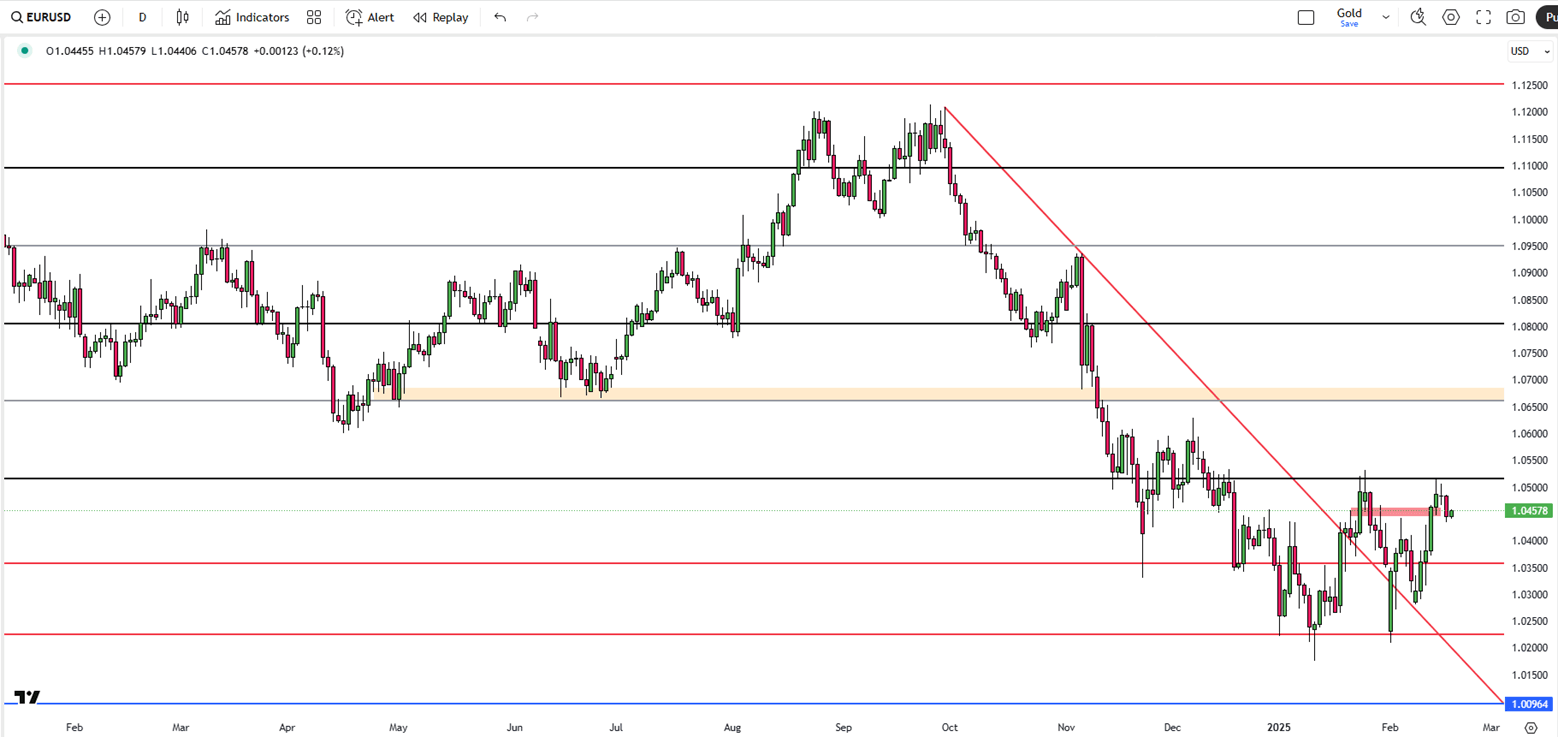
The euro slipped to $1.0450 as traders weighed the impact of rising defense spending on inflation and interest rates. With the U.S. planning to scale back Ukraine support and seek negotiations with Russia, European leaders met in Paris but reached no firm decisions. Strengthening defense and aiding Ukraine could cost Europe’s major economies $3.1 trillion over the next decade. Meanwhile, the ECB is expected to cut its deposit rate by 25 basis points at each of the next three meetings, potentially dropping below 2% by 2026.
Key resistance levels are at 1.0515, 1.0600, and 1.0650. Support stands at 1.0350, followed by 1.0275 and 1.0220.
| R1: 1.0515 | S1: 1.0350 |
| R2: 1.0600 | S2: 1.0275 |
| R3: 1.0650 | S3: 1.0220 |
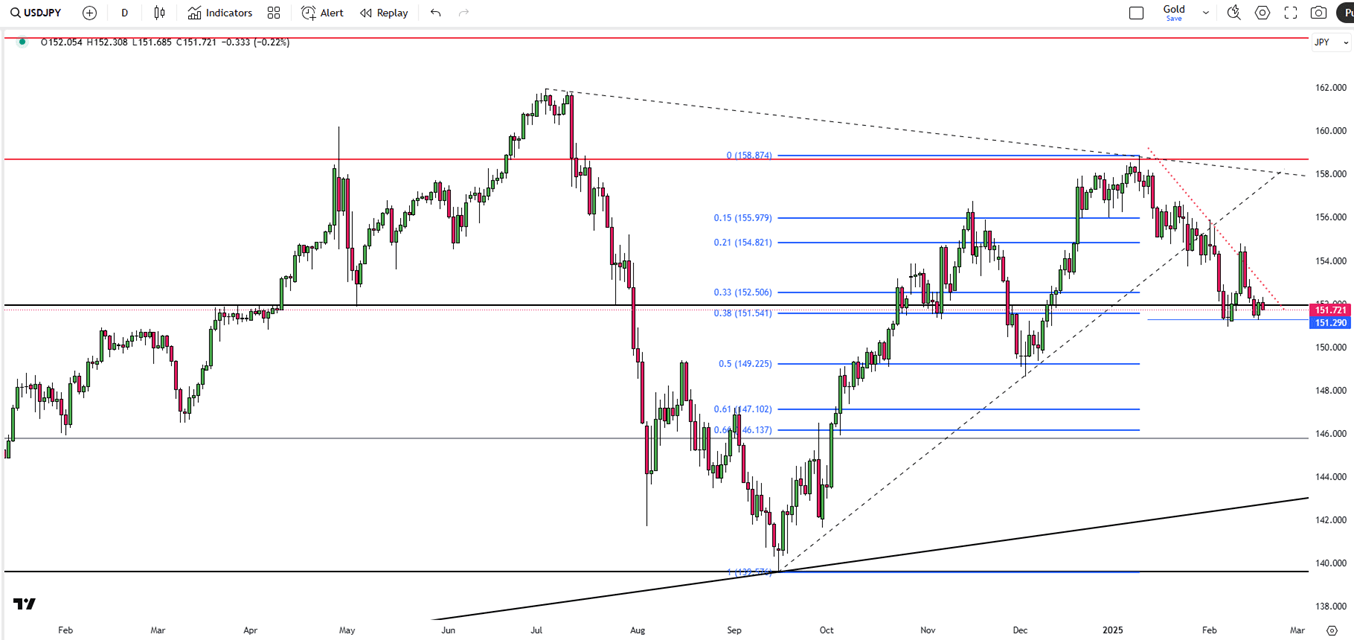
The Japanese yen hovered near 152 per dollar as weak economic data weighed on sentiment. Core machinery orders unexpectedly fell in December, and Japan’s trade deficit widened in January due to higher imports. While expectations of further BOJ rate hikes provided some support, uncertainty remains over a possible March increase. Meanwhile, a stronger US dollar pressured the yen, driven by President Trump’s new tariff threats, including a 25% levy on automobiles, semiconductors, and pharmaceuticals.
Key resistance stands at 154.90, with further levels at 156.00 and 157.00. Support is at 151.25, followed by 149.20 and 147.10.
| R1: 154.90 | S1: 151.25 |
| R2: 156.00 | S2: 149.20 |
| R3: 157.00 | S3: 147.10 |
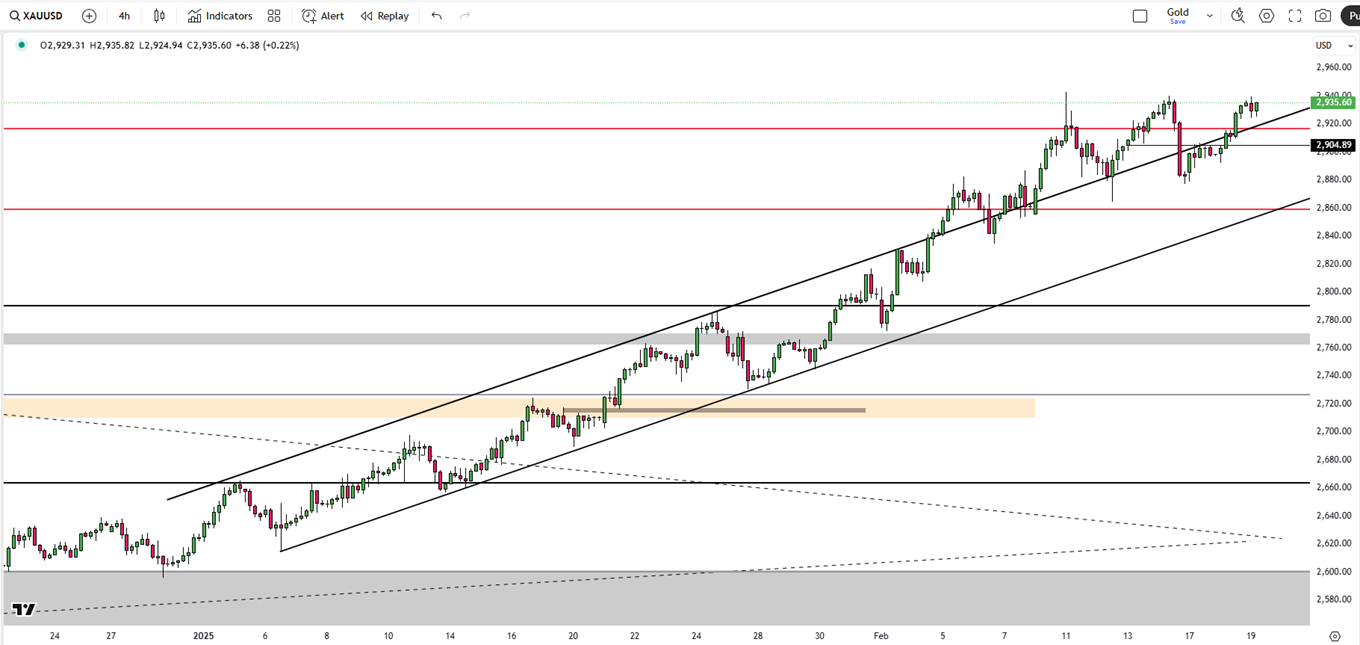
Gold held near $2,930 per ounce, just below last week’s record of $2,940. Former President Trump escalated trade concerns by announcing a 25% tariff on automobiles, semiconductors, and pharmaceuticals, with potential auto levies as early as April 2. Meanwhile, the White House hinted at lifting Russian sanctions, adding to geopolitical uncertainty. Fed officials maintained a cautious stance on rate cuts, with San Francisco Fed President Mary Daly noting inconsistent inflation progress. Gold shipments from Singapore to the US hit a three-year high in January due to pricing disruptions.
Key resistance is at $2,949, with further levels at $2,975 and $3,000. Support stands at $2,880, followed by $2,830 and $2,760.
| R1: 2949 | S1: 2880 |
| R2: 2975 | S2: 2830 |
| R3: 3000 | S3: 2760 |
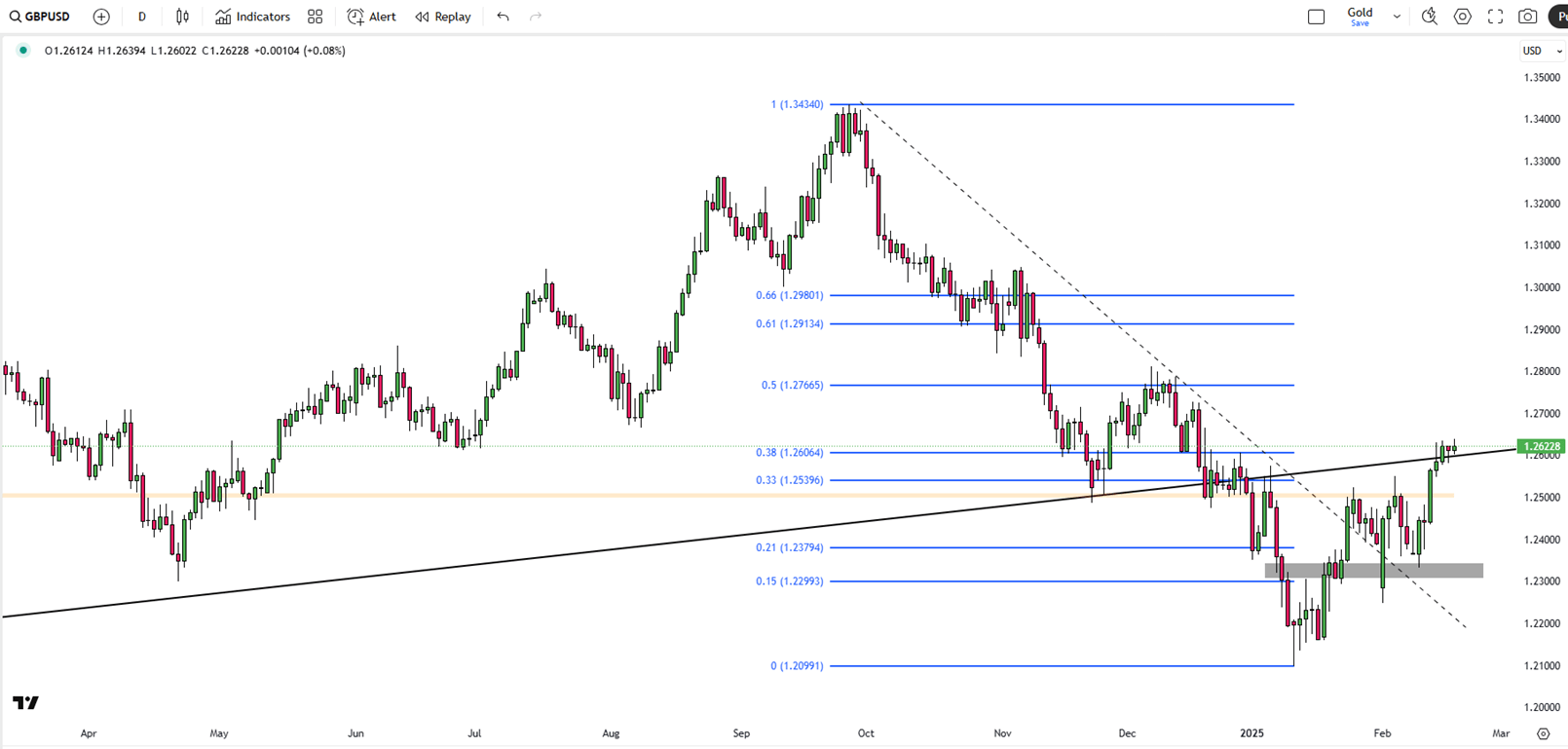
The British pound briefly strengthened before stabilizing at $1.26 as traders assessed a mixed labor market report. Wage growth rose in real terms in Q4 2024, but the unemployment rate held steady at 4.4% despite declining job vacancies and payrolls. The data reinforced the Bank of England’s cautious stance on rate cuts, with Governor Andrew Bailey citing wage growth as a key driver of inflation in services. Markets now await CPI and PPI data for further inflation insights. Meanwhile, investors are closely watching Ukraine peace talks led by Donald Trump and UK Prime Minister Keir Starmer’s proposal to deploy peacekeeping forces.
Key resistance is at 1.2650, with further levels at 1.2700 and 1.2766. Support stands at 1.2340, followed by 1.2265 and 1.2100.
| R1: 1.2650 | S1: 1.2340 |
| R2: 1.2700 | S2: 1.2265 |
| R3: 1.2766 | S3: 1.2100 |
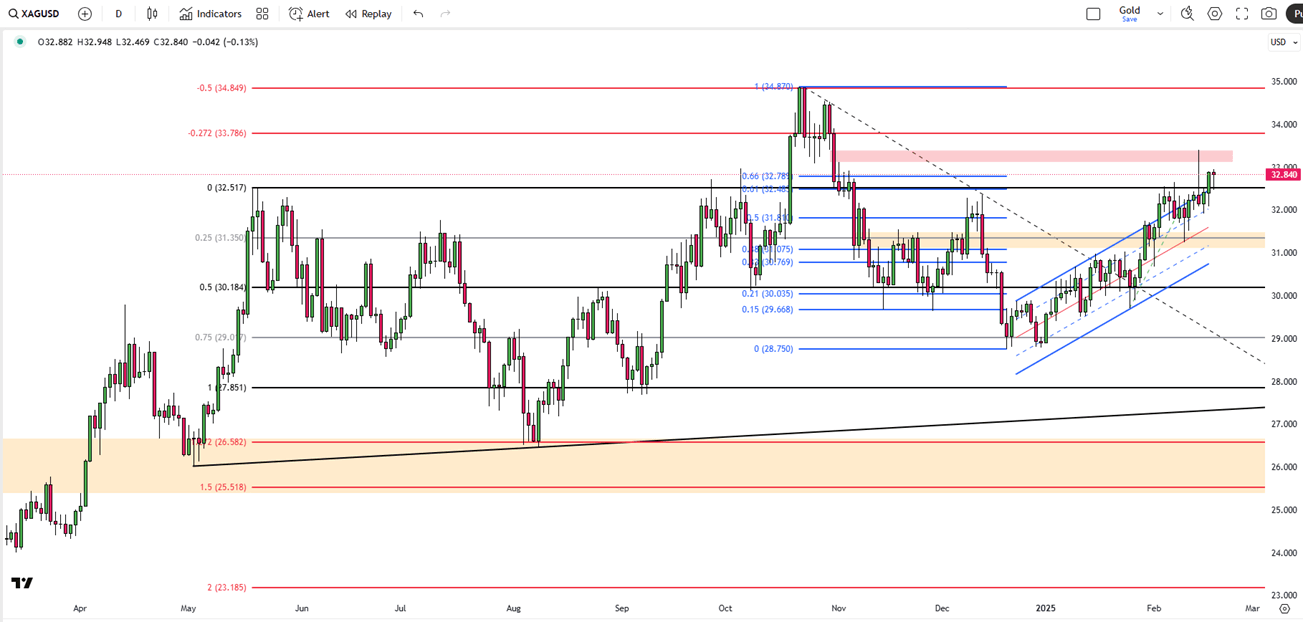
Silver edged toward $32.8 per ounce, maintaining a sideways trend. President Trump’s plan for reciprocal tariffs raised trade war fears, while US-led diplomatic efforts in Ukraine could impact silver’s appeal. Last week, silver hit a three-month high, supported by strong industrial demand, particularly in electrification and manufacturing. China’s addition of 357 gigawatts of solar and wind power in 2024 further boosted silver’s industrial use.
Key resistance stands at 33.15, with further levels at 33.80 and 34.50. Support is at 31.40, followed by 30.90 and 30.20.
| R1: 33.15 | S1: 31.40 |
| R2: 33.80 | S2: 30.90 |
| R3: 34.50 | S3: 30.20 |
 Días festivos de verano en el Reino Unido (25 y 26 de agosto de 2025)
Días festivos de verano en el Reino Unido (25 y 26 de agosto de 2025)Nos gustaría informarle de los ajustes en el calendario de negociación de los instrumentos que se indican a continuación con motivo de los días festivos de verano en Inglaterra y Gales los días 25 y 26 de agosto de 2025.
Detalle El euro cae ante la cautela de la Fed, la libra esterlina espera el IPC (20/08/2025)El euro cayó cerca de 1,1640 antes del discurso de Powell en Jackson Hole y las conversaciones de paz en Ucrania, mientras que el yen se fortaleció hasta 147,5 a pesar de las débiles cifras comerciales.
Detalle La libra se acerca a un máximo de cinco semanas por sólidos datos del Reino Unido (08.19.2025)El euro cayó hasta 1,1660 dólares, ya que las conversaciones de paz entre Trump, Zelenskiy y los líderes de la UE suscitaron preocupación, mientras que la atención se centró en el discurso de Powell en Jackson Hole y las actas de la Fed, con una probable bajada de tipos en septiembre.
DetalleÚnase a nuestro canal de Telegram y suscríbase gratis a nuestro boletín de señales de trading.
Únete a nosotros en Telegram